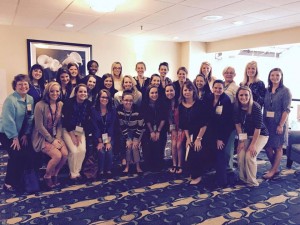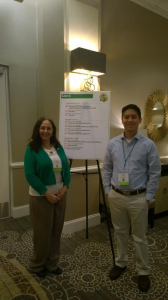Posts tagged travel
#VSCA15
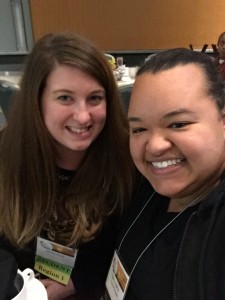 The Virginia School Counseling Association conference was a wonderful time of confirmation, learning, and renewal. It was excellent to be around other school counselors from around the state and to really feel like I belonged there. I related to the information being presented and really felt like it pertained to me and would be useful for my future career. This year I have taken an interest in topics that I don’t have much knowledge in and will inevitably be faced with in my career such as suicide, self harm, and eating disorders. I was so excited to see these topics in the breakout sessions as an opportunity to learn more about them and to connect to them on a more personal level. I felt like I left the conference more equipped with information and useful resources to use in addressing these issues in my counseling career. While I spent a lot of time learning, it was also a great time of renewal as we learned a lot about self care. Although I hear all the time that it’s important to take care of yourself first so that you can be an effective counselor it was great to hear tips on how to do that and to see examples of how well it really works and the impact that it can have not only on ourselves but on our students and our families! The two days I spent at the VSCA conference gave me tools that I will be able to stow away in my toolbox for future use in my career and I’m thankful to have had the opportunity to attend. I definitely look forward to going back!
The Virginia School Counseling Association conference was a wonderful time of confirmation, learning, and renewal. It was excellent to be around other school counselors from around the state and to really feel like I belonged there. I related to the information being presented and really felt like it pertained to me and would be useful for my future career. This year I have taken an interest in topics that I don’t have much knowledge in and will inevitably be faced with in my career such as suicide, self harm, and eating disorders. I was so excited to see these topics in the breakout sessions as an opportunity to learn more about them and to connect to them on a more personal level. I felt like I left the conference more equipped with information and useful resources to use in addressing these issues in my counseling career. While I spent a lot of time learning, it was also a great time of renewal as we learned a lot about self care. Although I hear all the time that it’s important to take care of yourself first so that you can be an effective counselor it was great to hear tips on how to do that and to see examples of how well it really works and the impact that it can have not only on ourselves but on our students and our families! The two days I spent at the VSCA conference gave me tools that I will be able to stow away in my toolbox for future use in my career and I’m thankful to have had the opportunity to attend. I definitely look forward to going back!
VSCA Conference Reflection
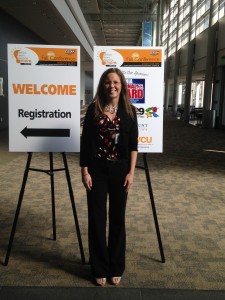 I attended the Virginia School Counselor Association (VSCA) on October 15, 2015 in Hampton, Virginia. The VSCA Conference was very informative, educational, and motivational that greatly added to my professional development. One of the main highlights of the conference was having the opportunity to listen to presenter Tara Brown. Ms. Brown was very inspirational and powerful as she provided an effective holistic approach while working with children. As a future school counselor, this gave me a different perspective of how to make effective connections with students and meet their emotional needs; there was an emphasis that building these relationships are more important than passing the Standards of Learning (SOLs). These human connections can drive the student’s emotional state, decisions, and actions that can either help or hinder student achievement. Throughout Ms. Brown’s presentation, she emphasized the importance of allowing the students to feel safe in school. By simply making the students feel safe, this can create a positive environment for learning and increase academics, behavior, and attendance. Another important highlight that was reinforced during this particular presentation is to remain enthusiastic everyday as a future school counselor, as enthusiasm is contagious. Ms. Brown also emphasized this in her presentation, as it truly can impact student academic performance. As I enter into the counseling field, I want the students to be excited about learning and achievement and give instill hope and encouragement to overcome barriers to education. Overall, the goal is to continue to close the student achievement gap, especially among males, and strive to implement effective strategies to meet diverse learning styles for all learners. I need to remember that males store and retrieve information differently than girls, and need to prepare and deliver lessons in the classroom, along with small and individual counseling sessions. By implementing all of these connective strategies for students, school counselors can discover the “root of the problem” and work with students to effectively problem solve strategies to find solutions.
I attended the Virginia School Counselor Association (VSCA) on October 15, 2015 in Hampton, Virginia. The VSCA Conference was very informative, educational, and motivational that greatly added to my professional development. One of the main highlights of the conference was having the opportunity to listen to presenter Tara Brown. Ms. Brown was very inspirational and powerful as she provided an effective holistic approach while working with children. As a future school counselor, this gave me a different perspective of how to make effective connections with students and meet their emotional needs; there was an emphasis that building these relationships are more important than passing the Standards of Learning (SOLs). These human connections can drive the student’s emotional state, decisions, and actions that can either help or hinder student achievement. Throughout Ms. Brown’s presentation, she emphasized the importance of allowing the students to feel safe in school. By simply making the students feel safe, this can create a positive environment for learning and increase academics, behavior, and attendance. Another important highlight that was reinforced during this particular presentation is to remain enthusiastic everyday as a future school counselor, as enthusiasm is contagious. Ms. Brown also emphasized this in her presentation, as it truly can impact student academic performance. As I enter into the counseling field, I want the students to be excited about learning and achievement and give instill hope and encouragement to overcome barriers to education. Overall, the goal is to continue to close the student achievement gap, especially among males, and strive to implement effective strategies to meet diverse learning styles for all learners. I need to remember that males store and retrieve information differently than girls, and need to prepare and deliver lessons in the classroom, along with small and individual counseling sessions. By implementing all of these connective strategies for students, school counselors can discover the “root of the problem” and work with students to effectively problem solve strategies to find solutions.
Another conference highlight included collaboration among professional school counselors and formulating networking opportunities for my future career. Through the interaction in small groups, I was able to gain valuable information on how school counselors that work in various school settings implement Positive Behavioral Interventions and Supports (PBIS) within their school counseling program and school system. This collaboration opportunity provide me with new insight into how PBIS could be integrated into my future profession. This evidence-based intervention works is effective for all students, but especially the ones who need additional individualized educational and behavioral support. Working with school counselors allowed me to see how they work with various stakeholders to implement the program and what strategies have been effective for them. Thus, I gained important tools for my “tool kit” to improve scholastic achievement for all students. In another counseling session, I was able to gain insight into how a school counselor integrated college and career readiness in the middle school setting. As this was a very informative session as well, the school counselor made learning about various college and careers that applied to their interests. She met with students during their lunch time called the College Café. I really liked this interactive approach, as I felt it provided a holistic approach to prepare students for their future educational and career goals. Even in middle school, emphasizing the importance for future planning and obtaining long and short term goals can help both students and parents prepare for their future after graduation. With interacting with other school counselors was both a highlight of the conference, it was also a benefit. Another benefit for me was having the opportunity to attend an elementary school counselor “show and tell workshop.” This workshop was for elementary school counselors to present various guidance lessons for grades K-7 that they implement into their curriculum. It was very effective for me because the lessons touched on the academic, social/emotional, and career domains of the ASCA National Model. As I aspire to be an elementary school counselor, this workshop provided me with an abundance of effective lessons and “tools” for all students that I will implement into my future counseling profession.
VSCA Conference 2015
 I am so grateful that I was able to attend the VSCA 2015 conference. During the conference I was able to choose from multiple breakout sessions on subjects that were relevant to the field of school counseling. The most eye opening session that I had the privilege to attend was a session on eating disorders. Since eating disorders are so prevalent among teens I wanted to learn more about it, and I am glad I did. I was able to gain more perspective and insight due to the presenter’s personal account of her daughter’s struggle with the disorder. I was also fortunate enough to hear John Hodge’s keynote speech called BE THE ONE! He encourages everyone to get invested in their students because sometimes one person can make a difference. The VSCA conference taught me a lot about the field that I was pursuing a degree in, but most of all it left me uplifted, empowered, and confident that this was field for me.
I am so grateful that I was able to attend the VSCA 2015 conference. During the conference I was able to choose from multiple breakout sessions on subjects that were relevant to the field of school counseling. The most eye opening session that I had the privilege to attend was a session on eating disorders. Since eating disorders are so prevalent among teens I wanted to learn more about it, and I am glad I did. I was able to gain more perspective and insight due to the presenter’s personal account of her daughter’s struggle with the disorder. I was also fortunate enough to hear John Hodge’s keynote speech called BE THE ONE! He encourages everyone to get invested in their students because sometimes one person can make a difference. The VSCA conference taught me a lot about the field that I was pursuing a degree in, but most of all it left me uplifted, empowered, and confident that this was field for me.
Blue Ridge Symposium
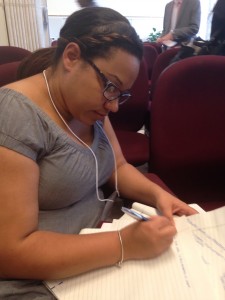 Having the opportunity to attend the Blue Ridge Symposium was really awesome. I was able to spend time with three professors in my discipline in addition to my class mate. Hearing Paul Matsuda speak enhanced the course materials related to his theoretical approach. My ability to apply the concepts from class was really improved by hearing the various speakers and having the chance to converse with colleagues.
Having the opportunity to attend the Blue Ridge Symposium was really awesome. I was able to spend time with three professors in my discipline in addition to my class mate. Hearing Paul Matsuda speak enhanced the course materials related to his theoretical approach. My ability to apply the concepts from class was really improved by hearing the various speakers and having the chance to converse with colleagues.
SHAV Conference 2015
I was afforded the opportunity to attend the Speech Hearing Association of Virginia (SHAV) 2015 conference. During this conference I was able to attend multiple sessions ranging from facilitating language with pre-school children with hearing loss, understanding common medical diagnoses and their relationship to swallowing disorders, treatment and evaluation of students with autism, and selecting an appropriate communication method for students with alternative and augmentative communication needs. At SHAV, I was also given the opportunity to interact with experienced speech-language pathologists within the area and to speak with local employers. SHAV allowed me to not only expand upon the knowledge I have gained at Longwood University, but it also allowed me to begin connecting with employers and working speech-language pathologists, which I hope will become valuable resources and connections following my graduation this coming May.
VSRA Reflection on Media Literacy
The VSRA conference supported my professional development in a way that no other professional development experience has. I was able to collaborate with people in varying aspects of our field. This allowed me to build contacts and resources that I would not have had access to otherwise. I met Professors, Researchers, Authors, Superintendents, Reading Specialist, expert teachers, and other graduate students. The experience was irreplaceable for me. I have grown professionally and academically. Presenting in class or demonstrating lessons for faculty or students is no longer a situation that makes me anxious. Experiencing presenting in this forum gave me the necessary tools to further my academic career and my professional career.
2015 Blue Ridge Symposium
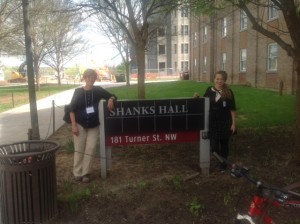 On April 18th, I had the privilege to attend the 2015 Blue Ridge Symposium at Virginia Tech. The original date in February was cancelled due to snow, but it was certainly worth the wait.
On April 18th, I had the privilege to attend the 2015 Blue Ridge Symposium at Virginia Tech. The original date in February was cancelled due to snow, but it was certainly worth the wait.
The symposium consisted of two keynote speakers, Paul Kei Matsuda and Alexis Hart, as well as a panel of graduate students attending (and teaching) at Virginia Tech. This year’s subject was diversity in the college classroom, first generation college students, and L2 learners (students whose first language is something other than English. This term is preferred to ESL generally, and I honestly agree with it because referring to a student as “ESL” prioritizes English over their first language–which shouldn’t be the case).
One of Matsuda’s major points regarded the myth of a homogenous university, and the importance of college instructors learning to accommodate the increase of L2 writers in the classroom. Also, understanding the different cultural values students will bring in and how that changes their perception. For instance, plagiarism. I have been warned about the repercussions of plagiarism throughout my education, but the ideas about intellectual integrity vary from culture to culture, thus, making it an even more complex issue to deal with in the classroom. Matsuda also suggested college instructors perhaps learn ways that they can accommodate L2 learners in their classroom, and I think he’s absolutely right in that.
Alexis Hart’s talk regarding student veterans was particularly compelling to me because I haven’t really thought about the diversity they contribute to a classroom, but thinking about it now they really do. Veteran students have very different experiences that will influence their presence in the classroom, as well as their approach to academic work. In my personal experience, friends of mine who are student veterans tend to be much more mature, however, as Hart’s talk emphasizes, it’s much more complex than that. She suggests that college instructors make sure student veterans know what resources their university has for them, both academically and emotionally. I really liked her suggestions for college instructors as far as accommodating veteran students. One that I particularly liked was to have the syllabus available before the course begins so they can know what they’re in for, particularly if the class plans to cover something triggering they can drop the class, or speak to the professor in advance.
One of my favorite suggestions for helping L2 learners’ writing process is to allow them to pre-write and draft in their first language, and then to write their final papers in English. Matsuda also suggests allowing students to use academic sources in other languages.
Many thanks to my professor, Dr. Lettner-Rust, for such a great opportunity! I certainly learned a lot about what to consider for my own future classrooms. Also, free books! Who wouldn’t love a conference with free books?
2015 Virginia Social Science Association Conference
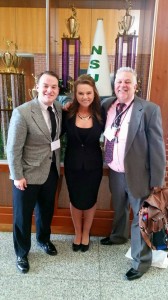 As a graduate student, the opportunity to present research and gain experience through a conference setting is vital. The benefits we gained from this experience are irreplaceable, and being granted the chance to network and discuss future research with other graduate students and professors was most helpful. As an upcoming graduate, this experience helped me to gain a better understanding of the expectations at conferences as well as gave me an advantage in my career search. All three of us in attendance from Longwood University feel as though this was a most beneficial conference to attend and see all of our hard work pay off.
As a graduate student, the opportunity to present research and gain experience through a conference setting is vital. The benefits we gained from this experience are irreplaceable, and being granted the chance to network and discuss future research with other graduate students and professors was most helpful. As an upcoming graduate, this experience helped me to gain a better understanding of the expectations at conferences as well as gave me an advantage in my career search. All three of us in attendance from Longwood University feel as though this was a most beneficial conference to attend and see all of our hard work pay off.
SHAV Convention 2015
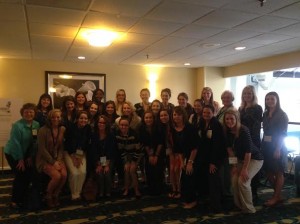 I had the privilege of attending the Speech-Language-Hearing Association of Virginia’s annual conference held in Richmond, Virginia. I attended the day-long conference on Thursday, March 26th and Friday, March 27th. This was my second year attending the conference and I hope to continue this new tradition in the years ahead. I had the opportunity to attend sessions held by a variety of experienced and educated professionals including speech-language pathologists, health care administrators, and otolaryngologists. Each session was engaging and highly educational. The sessions in which I attended were on the topics of swallowing, voice, intervention in ICU, providing services for individuals with severe disabilities, service delivery, auditory processing disorders, and autism spectrum disorder (ASD). The information that I learned from attending these sessions directly relates to the information I have learned from the graduate program at Longwood University. I will use the knowledge I learned at the SHAV 2015 Convention in my current internship and throughout my future career as a speech-language pathologist. I am thankful to have had this great opportunity.
I had the privilege of attending the Speech-Language-Hearing Association of Virginia’s annual conference held in Richmond, Virginia. I attended the day-long conference on Thursday, March 26th and Friday, March 27th. This was my second year attending the conference and I hope to continue this new tradition in the years ahead. I had the opportunity to attend sessions held by a variety of experienced and educated professionals including speech-language pathologists, health care administrators, and otolaryngologists. Each session was engaging and highly educational. The sessions in which I attended were on the topics of swallowing, voice, intervention in ICU, providing services for individuals with severe disabilities, service delivery, auditory processing disorders, and autism spectrum disorder (ASD). The information that I learned from attending these sessions directly relates to the information I have learned from the graduate program at Longwood University. I will use the knowledge I learned at the SHAV 2015 Convention in my current internship and throughout my future career as a speech-language pathologist. I am thankful to have had this great opportunity.
SHAV 2015 Conference Review
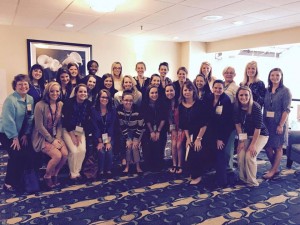 This past weekend I attended my first SHAV conference in Richmond, VA. As a first year attendee I didn’t know what to expect, and I was overwhelmed by the number of seminars available. One seminar that caught my attention was titled Using Structured ‘TEACCHing’ to Build Communication in Students with ASD. This two-hour session highlighted how the use of visual supports, such as visual schedules, can be used to increase independence and decrease behavioral issues in students diagnosed with Autism Spectrum Disorder. At the end of the session we examined several of the visual supports that presenter Diane Talarico-Cavanaugh, M.ED. has created and modified. We were then encouraged to take away a few of the printed supports to use in therapy sessions. In addition to attending the seminars, I spent time walking around the exhibit hall. I explored vendor resources that can be implemented into therapy such as articulation cards, and sampled Simplythick Instant Food Thickener for the first time. Overall, this experience was educational and fun! I enjoyed expanding my education outside of the classroom and clinic, and especially enjoyed sharing the experience with Longwood peers and faculty!
This past weekend I attended my first SHAV conference in Richmond, VA. As a first year attendee I didn’t know what to expect, and I was overwhelmed by the number of seminars available. One seminar that caught my attention was titled Using Structured ‘TEACCHing’ to Build Communication in Students with ASD. This two-hour session highlighted how the use of visual supports, such as visual schedules, can be used to increase independence and decrease behavioral issues in students diagnosed with Autism Spectrum Disorder. At the end of the session we examined several of the visual supports that presenter Diane Talarico-Cavanaugh, M.ED. has created and modified. We were then encouraged to take away a few of the printed supports to use in therapy sessions. In addition to attending the seminars, I spent time walking around the exhibit hall. I explored vendor resources that can be implemented into therapy such as articulation cards, and sampled Simplythick Instant Food Thickener for the first time. Overall, this experience was educational and fun! I enjoyed expanding my education outside of the classroom and clinic, and especially enjoyed sharing the experience with Longwood peers and faculty!
Catherine Stergar
